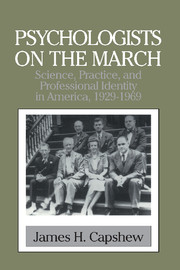Book contents
- Frontmatter
- Contents
- Acknowledgments
- List of Abbreviations
- Introduction: The Psychologists' War
- Interlude I
- 1 Growing Pains: After the Great War
- 2 Mobilizing for World War II: From National Defense to Professional Unity
- 3 Home Fires: Female Psychologists and the Politics of Gender
- Interlude II
- 4 Sorting Soldiers: Psychology as Personnel Management
- 5 Applied Human Relations: The Utility of Social Psychology
- 6 From the Margins: Making the Clinical Connection
- 7 Engineering Behavior: Applied Experimental Psychology
- Interlude III
- 8 A New Order: Postwar Support for Psychology
- 9 Remodeling the Academic Home
- Interlude IV
- 10 The Mirror of Practice: Toward a Reflexive Science
- 11 Beyond the Laboratory: Giving Psychology Away
- Interlude V
- Epilogue: Science in Search of Self
- Index
Interlude IV
Published online by Cambridge University Press: 06 July 2010
- Frontmatter
- Contents
- Acknowledgments
- List of Abbreviations
- Introduction: The Psychologists' War
- Interlude I
- 1 Growing Pains: After the Great War
- 2 Mobilizing for World War II: From National Defense to Professional Unity
- 3 Home Fires: Female Psychologists and the Politics of Gender
- Interlude II
- 4 Sorting Soldiers: Psychology as Personnel Management
- 5 Applied Human Relations: The Utility of Social Psychology
- 6 From the Margins: Making the Clinical Connection
- 7 Engineering Behavior: Applied Experimental Psychology
- Interlude III
- 8 A New Order: Postwar Support for Psychology
- 9 Remodeling the Academic Home
- Interlude IV
- 10 The Mirror of Practice: Toward a Reflexive Science
- 11 Beyond the Laboratory: Giving Psychology Away
- Interlude V
- Epilogue: Science in Search of Self
- Index
Summary
In April 1928, with the publication of A History of Experimental Psychology a year away, Edwin Boring wrote to Carl Murchison about his need for “facts concerning the scientific development of certain individuals” that could be obtained only from autobiography. Murchison, a psychologist at Clark University, was an active editor and publisher of psychology books and periodicals. Soon plans were laid to invite influential psychologists to contribute their life stories to a series of edited volumes entitled A History of Psychology in Autobiography. The rationale for the project was stated simply and directly: “Since a science separated from its history lacks direction and promises a future of uncertain importance, it is a matter of consequence to those who wish to understand psychology for those individuals who have greatly influenced contemporary psychology to put into print as much of their personal histories as bears on their professional careers.” The first volume, comprised of contributions from fifteen psychologists, was published in 1930. Two more volumes appeared, in 1932 and 1936, before the series was abandoned.
In 1952, not long after the publication of the second edition of A History of Experimental Psychology, the series was revived. Now Boring had his turn as a contributor, and he produced a remarkably candid account of his personal and professional life. He traced his career chronologically and ended with an attempt to put himself in perspective by outlining what he saw as the major aspects of his personality.
- Type
- Chapter
- Information
- Psychologists on the MarchScience, Practice, and Professional Identity in America, 1929–1969, pp. 209 - 211Publisher: Cambridge University PressPrint publication year: 1999

